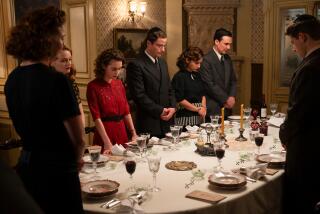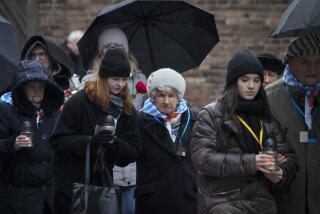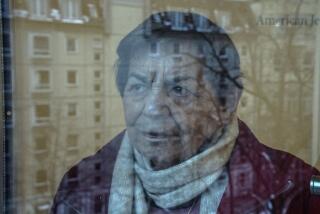Holocaust survivors gather to mark 1945 liberation from Auschwitz
Roman Kent paused briefly, as if he still needed convincing.
“You are in the German concentration camp in Auschwitz,” he bluntly told the audience — words that, even after seven decades, still have the power to evoke horror.
Kent, a former Auschwitz inmate who was born in Poland, was among nearly 300 Holocaust survivors who joined international leaders Tuesday at the former Nazi-run death camps at Auschwitz-Birkenau to commemorate the 70th anniversary of their liberation.
The anniversary culminated in a ceremony held in a massive tent that seated thousands. Behind the podium stood the brick facade of a building in Birkenau, its entrance open. In the distance, through a drizzle of snow, stood guard towers and barracks.
Those in attendance included heads of state from much of Europe, including French President Francois Hollande and German President Joachim Gauck. Treasury Secretary Jacob J. Lew led the U.S. delegation, which included U.S. Ambassador to Poland Stephen Mull. Steven Spielberg, who had directed a short film shown during the ceremony, also was present.
Auschwitz, a city of death, has come to symbolize human brutality at its most sophisticated and horrific. The sprawling complex, which includes Auschwitz I and Auschwitz II-Birkenau, was the site of the killing of more than 1.1 million people (some estimates say as many as 1.5 million), about 900,000 of them Jews.
The commemoration Tuesday was considered significant because it is likely to be the last time that many survivors — most now in their 80s and 90s — will be able to participate.
Over the course of the day, former inmates walked through the camps, their arms often interlocked with those of family members who accompanied them. Some pulled up sleeves to show the inmate numbers tattooed on their forearms. They had come to commemorate, but the memories were painful.
“I normally have been able to separate myself from the whole idea of what occurred 70 years ago; it’s a lifetime ago, really,” said David Wisnia, 88, who lives in Philadelphia. But the night before the ceremony, “I had a horrible dream. I woke up in the middle of the night and looked out the window and thought that I was back in Birkenau in cellblock 14, where I started in 1942.”
Auschwitz is now a museum; its buildings and exhibitions stand as stark reminders of the past. But Halina Birenbaum, an Auschwitz survivor, writer and poet, reminded the audience that the barbarity of the place cannot be fully understood by those who weren’t there.
“Auschwitz was a bottomless pit of hell that I couldn’t get out of … stinking mud, some figures muddling through, cannot tell whether they are old or young, man or woman, lousy wet rags, with numbers, with shaved heads, gray bony faces with legs like sticks.... I remembered there was a Christmas tree, and on the other side, there was fire — fire that burned bodies. I was there, so very much there,” Birenbaum said.
Soon, memories of Auschwitz and of the Holocaust will be found only in books, documents and recorded interviews. Implicit in the presence of survivors Tuesday was the insistence that what happened to them must not be forgotten, that indifference is the enemy.
“We do not want our past to be our children’s future,” said Kent, a New Yorker who is president of the Jewish Foundation for the Righteous and chairman of the American Gathering of Jewish Holocaust Survivors.
There was an eruption of applause. Kent grimaced.
“You interrupted me with applause, but I want to say this again: We do not want our past to be our children’s future,” he said, his voice cracking. “We survivors cannot, dare not, forget the millions who were murdered. For if we were to forget, the consciousness of mankind would be buried alongside the victims.”
Polish President Bronislaw Komorowski and American philanthropist Ronald Lauder drew connections between past and present.
Komorowski cited author and former Auschwitz inmate Elie Wiesel, who wrote that “to forget the dead would be akin to killing them a second time.”
Lauder warned of increasing anti-Semitism in Europe. “Once again, young Jewish boys are afraid to wear yarmulkes on the streets of Paris, London, Budapest and even Berlin,” he said.
Against the grim backdrop, there was also talk of hope, of God and of love.
At a Mass said in Auschwitz’s Center for Dialogue and Prayer, Polish Cardinal Stanislaw Dziwisz repeated questions that have been asked many times since the Holocaust: “What does God think of this? Where was he when this happened?”
During the main ceremony at Birkenau, Wisnia, the Philadelphia resident, sang “El malei rachamim,” a Jewish funeral prayer, altering the lyrics so that it included mention of Auschwitz and Birkenau. Many in the audience began to cry.
Wisnia, who sang in choirs as a child and became a cantor after his release from Auschwitz, said his fear of God and his love of music kept him going in the camp.
“I’m a believer,” he said in an interview.
As the ceremony came to a close, survivors laid candles at a monument in the Birkenau camp and the words of Birenbaum hung in the air: “All that remained were ashes.”
Rom is a special correspondent
More to Read
Start your day right
Sign up for Essential California for news, features and recommendations from the L.A. Times and beyond in your inbox six days a week.
You may occasionally receive promotional content from the Los Angeles Times.






